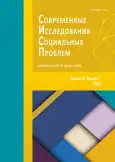Historical commentary in the Russian language lesson as a pedagogical genre
- Authors: Kalinin K.A.1
-
Affiliations:
- Naberezhnye Chelny State Pedagogical University
- Issue: Vol 17, No 1 (2025)
- Pages: 59-75
- Section: Language and Literature Studies
- Published: 31.03.2025
- URL: https://bakhtiniada.ru/2077-1770/article/view/305500
- DOI: https://doi.org/10.12731/2077-1770-2025-17-1-495
- EDN: https://elibrary.ru/VOTFHQ
- ID: 305500
Cite item
Full Text
Abstract
Background. The implementation of the historical approach is an important prerequisite for in-depth study of the Russian language. Historical commentary on linguistic facts and patterns helps to understand the cause-and-effect relationships of those phenomena, the study of which is impossible without referring to the history of the development of the Russian language. At the same time, there are a number of issues in this area that require theoretical and practical development, in particular, the specifics of using historical commentary in the context of academic activities.
Purpose. The aim of the paper is to identify the main features of historical commentary in the Russian language lesson as a speech genre of pedagogical communication.
Materials and methods. The materials for the study were studies devoted to the historical coverage of the facts of the Russian language and their inclusion in the learning process in the classroom. The article uses methods of description, typologization and generalization to characterize historical commentary as a pedagogical genre in Russian language lessons.
Results. The paper provides a detailed description of historical commentary in Russian language lessons as a speech genre of pedagogical communication. Its formal feature is the formalization in the form of a concise word by the teacher, and its substantive feature is the reflection of the cause-and-effect relationships of facts and patterns of the Russian language from the perspective of its history. It is noted that the historical commentary should be prepared in advance, have a concise form and thematic conditionality. These characteristics formed the basis of the proposed definition of historical commentary as a pedagogical genre. Of particular note is the dependence of the preparation of a historical commentary for the study of a particular topic on the age of students and their level of proficiency in the subject matter. A well-constructed historical commentary in the lesson contributes to a more meaningful study of the Russian language, expands the linguistic horizons and forms the cultural competence of students.
About the authors
Konstantin A. Kalinin
Naberezhnye Chelny State Pedagogical University
Author for correspondence.
Email: filologkalinin@mail.ru
ORCID iD: 0000-0002-9062-9616
SPIN-code: 5598-7107
PhD in Philology, Acting Head of the Department of Russian and Tatar Philology
Russian Federation, 28, Nizametdinov Str., Naberezhnye Chelny, 423806, Russian FederationReferences
- Barabanova, M. Y. (2019). Old Russian text as a material for forming cultural competence when teaching Russian language. In University of the XXI Century: Scientific Dimension (pp. 199–202). Tula: Tolstoy TSPU.
- Bakhtin, M. M. (1979). Speech genres problem. In Aesthetics of Verbal Artistry (pp. 237–281). Moscow: Iskusstvo.
- Library of Ancient Russian Literature. (1997). Ed. by D. S. Likhachev et al. Twelfth century. Saint Petersburg: Nauka. 687 pp.
- Bokatina, Y. I. (2006). Historical commenting in the system of methodical training of philology students. Abstract of Candidate Dissertation. Moscow. 17 pp.
- Bokatina, Y. I. (2008). On realization of historical approach in teaching schoolchildren Russian language. Almanac of Modern Science and Education, (2), 24–26.
- Yeremina, S. A. (2015). Optional course on history of language as a means of preparing students for all-Russian Russian language olympiads. Philological Classroom, (4), 65–70.
- Zaiceva, O. N. (2002). History of Russian language as a structurally substantive component of the school curriculum. Abstract of candidate dissertation. Moscow. 16 pp.
- Kadykova, V. S., & Kurysheva, M. V. (2011). Historical commentary as a technique for developing linguistic competence in younger students. Bulletin of Tomsk State Pedagogical University, (10), 119–123.
- Kalinin, K. A. (2022). Using electronic dictionaries in studying Russian language etymology in rural schools. Pedagogy of Rural Schools, (3), 108–119.
- Kamenskaya, O. G., & Mustafina, E. G. (2004). Old Russian texts in Russian language classes at school. Russian Language at School, (2), 6–13.
- Kamchatnov, A. M. (2013). False-name word formation. Bulletin of the Literary Institute named after A. M. Gorky, (3), 22–32.
- Korshunova, Yu. M. (2016). Historical method in teaching Russian language in contemporary schools. In Problems of Modern Philological Education, Issue XIV (pp. 224–229). Moscow: MGPU; Yaroslavl: Remder.
- Kunavin, B. V. (2019). Interdisciplinary connections: use of historical comments in Russian language lessons. Bulletin of North Ossetian State University named after K. L. Khetagurov, (1), 50–54.
- Kyrcunova, L. G., & Karzenkova, Ye. P. (2021). Speech genres of pedagogical communication. Scientific Journal, (1), 15–26.
- Pelihov, D. A. (2011). Elements of comparative-historical method in Russian language lessons. Philological Classroom, (25), 75–78.
Supplementary files










